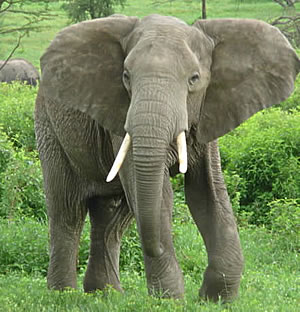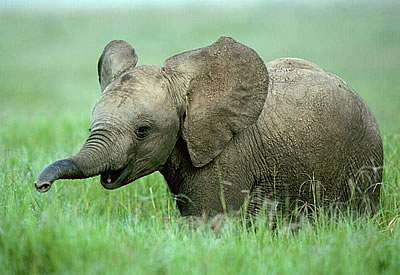Giant Elephants

Elephants, the largest animals on land, have two major kinds of species; African and Asian elephants. African elephants are larger than the others. They may be as high as three and a half metres (12 feet) and their weight reach around six tons (12,000 pounds). Their fan-shaped ears are two metres (6.5 feet) long and one and a half metres (5 feet) wide. As you can imagine, with such a giant body, you can't keep an elephant at home as a pet.
What makes an elephant especially different is his trunk. This long trunk, similar to a garden hose, includes fifty thousand muscles. What you have read is right: "50,000" muscles! Its nostrils are at the tip of this trunk. Elephants use their trunks to put food and water into their mouths, to lift things and, of course, to smell. This trunk is capable of holding four litres of water. They either squirt this water into their mounts and drink it or spray it on their bodies.
Surprisingly, an elephant can even pick up a tiny pea seed with its trunk – which can lift such huge things – break it in its mouth and eat it. It is really amazing that such a huge animal can accomplish such delicate operations. This "multifunctional" trunk can be used as a long finger, a trumpet or sometimes as a loudspeaker.
Besides that, elephants use their trunks to spray water on themselves to have a shower or throw dust on themselves for a dust-bath. Yet, new-born elephants fail to use their trunks. They sometimes even step on their trunks and fall down. We may find this amusing but surely these little babies do not like it. A mother elephant accompanies her young elephant for twelve years. During the first six months, she teaches the baby how to use its trunk and she never becomes bored doing this.

On both sides of their mouths, elephants have two long sharp tusks. These tusks help them to protect themselves. Also, an elephant uses one of these tusks to dig holes in the ground and find water.
The teeth of these animals – which chew fibrous plants – wear out easily. For this reason, our Lord has given them a very important characteristic: Every worn-out tooth is replaced by another in the back row.
One full-grown elephant can eat 330 kilograms (726 pounds) of plants everyday. This amount is equal to six small bales of straw. Everyday, elephants spend most of their time feeding themselves.
Now, let us give you another interesting piece of information about elephants. Have you ever thought how these huge thick-skinned animals cool themselves? As you might imagine, elephants cannot sweat because of their thick skins. Instead, they cool themselves with the help of the water and mud they see around. Of course, elephants have other methods to freshen themselves. For example, they use their ears as fans and cool their bodies with them. The thin blood veins on their ears also cool them and cause overall refreshment.
Another feature of elephants has surprised hunters and zoologists for a long time. What astonished them was the rumbling of elephants' stomachs. While rumbling, elephants' stomachs make very loud noises.

Yet, what is astonishing is not the loudness of these noises but the way elephants control them. In fact these noises have nothing to do with digestion. The elephants make these noises to detect the location of their friends. More surprisingly, in the face of a danger, they all of a sudden become silent. Once they sense the threat is over, they start making noise again. Thanks to this method, elephants can communicate with one another even from four kilometres away.
The migration stories of elephants have always astonished zoologists. These animals with their giant ears and huge bodies migrate in the dry seasons and always follow the same paths. What is even more interesting is that they clean up garbage such as chips of wood they find on their way.
Since elephants are animals that spread over vast areas of land, it is essential that they establish strong "communications" between them. Elephants do not owe this communication to their sharp sense of smell alone. Beside this, Allah has created an organ on their forehead, which makes a hoarse noise. Thanks to this organ, elephants talk to each other with a secret, coded language other animals fail to understand. These hoarse noises elephants make can reach very long distances. For this reason, this special noise that elephants make is ideal for long distance conversation.
- Introduction
- The Squirrel: The Walnut-Lover
- Rabbits Like Carrots!
- The Loyal Animal: The Dog
- Little White Lambs
- Our Faithful Friends: Horses
- Horses In Stripes: Zebras
- Giraffes: Like Speckled Towers
- Giant Elephants
- Deer: Famous For Their Antlers
- Kangaroos and Their Pockets
- The Koala The Sleepyhead
- Playful Cats Who Want To Be Cherished
- The King of The Jungle: The Lion
- Wild Cats: Tigers
- Masked Pandas
- Bears are Fond of Honey
- Giant Snowmen: Polar Bears
- Fast Swimmers: Seals
- Penguins in Their Tuxedos
- Fisher Puffins
- Sovereigns of The Skies: Birds
- Long-Legged Storks
- A Pink Bird: The Flamingo
- Elegant Swans
- Ostriches (So Big That They can't Fly!)
- The Resplendent Peacock
- A Bird Which Mimics: The Parrot
- Ducks with Green Heads
- The Butterfly: A Miracle of Colours
- Inhabitants of The Oceans: Fish
- The Clown Fish
- Dolphins with Smiling Faces
- Giant Whales
- Conclusion
